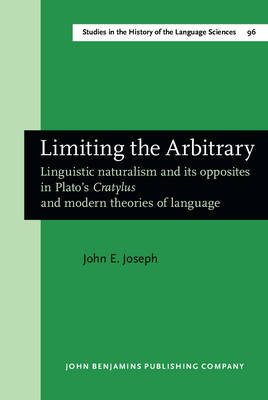
Limiting the Arbitrary
Linguistic naturalism and its opposites in Plato's Cratylus and modern theories of language
Seiten
2000
John Benjamins Publishing Co (Verlag)
978-90-272-4585-4 (ISBN)
John Benjamins Publishing Co (Verlag)
978-90-272-4585-4 (ISBN)
The idea that some aspects of language are "natural" while others are arbitrary or artificial, runs through modern linguistics. This title traces the heritage of linguistic naturalism back to Plato's "Cratylus". The first part details the linguistic arguments in the Cratylus.
The idea that some aspects of language are ‘natural’, while others are arbitrary, artificial or derived, runs all through modern linguistics, from Chomsky’s GB theory and Minimalist program and his concept of E- and I-language, to Greenberg’s search for linguistic universals, Pinker’s views on regular and irregular morphology and the brain, and the markedness-based constraints of Optimality Theory. This book traces the heritage of this linguistic naturalism back to its locus classicus, Plato’s dialogue Cratylus. The first half of the book is a detailed examination of the linguistic arguments in the Cratylus. The second half follows three of the dialogue’s naturalistic themes through subsequent linguistic history — natural grammar and conventional words, from Aristotle to Pinker; natural dialect and artificial language, from Varro to Chomsky; and invisible hierarchies, from Jakobson to Optimality Theory — in search of a way forward beyond these seductive yet spurious and limiting dichotomies.
The idea that some aspects of language are ‘natural’, while others are arbitrary, artificial or derived, runs all through modern linguistics, from Chomsky’s GB theory and Minimalist program and his concept of E- and I-language, to Greenberg’s search for linguistic universals, Pinker’s views on regular and irregular morphology and the brain, and the markedness-based constraints of Optimality Theory. This book traces the heritage of this linguistic naturalism back to its locus classicus, Plato’s dialogue Cratylus. The first half of the book is a detailed examination of the linguistic arguments in the Cratylus. The second half follows three of the dialogue’s naturalistic themes through subsequent linguistic history — natural grammar and conventional words, from Aristotle to Pinker; natural dialect and artificial language, from Varro to Chomsky; and invisible hierarchies, from Jakobson to Optimality Theory — in search of a way forward beyond these seductive yet spurious and limiting dichotomies.
1. Foreword; 2. Introduction; 3. Natural and Unnatural Language; 4. Part one: cratylus; 5. 1. Nature and Convention: Cratylus 383a1-391d1; 6. 2. Words and Truth: Cratylus 391d2-422e1; 7. 3. Imitation and Essence: Cratylus 422e1-440e1; 8. Part two: after cratylus; 9. 4. Natural Grammar and Conventional Words, from Aristotle to Pinker; 10. 5. Natural Dialect and Artificial Language, from Varro to Chomsky; 11. 6. Invisible Hierarchies, from Jakobson to Optimality Theory; 12. Afterword; 13. Linguistics after Naturalism; 14. References; 15. Index
| Erscheint lt. Verlag | 15.10.2000 |
|---|---|
| Reihe/Serie | Studies in the History of the Language Sciences ; 96 |
| Verlagsort | Amsterdam |
| Sprache | englisch |
| Maße | 164 x 245 mm |
| Gewicht | 430 g |
| Themenwelt | Geisteswissenschaften ► Philosophie ► Sprachphilosophie |
| ISBN-10 | 90-272-4585-1 / 9027245851 |
| ISBN-13 | 978-90-272-4585-4 / 9789027245854 |
| Zustand | Neuware |
| Haben Sie eine Frage zum Produkt? |
Mehr entdecken
aus dem Bereich
aus dem Bereich
Macht und Legitimität politischer Sprache im Prozess der europäischen …
Buch | Softcover (2023)
Nomos (Verlag)
CHF 103,60
Wie die Menschheit zu ihrer größten Erfindung kam
Buch | Softcover (2022)
C.H.Beck (Verlag)
CHF 25,20


